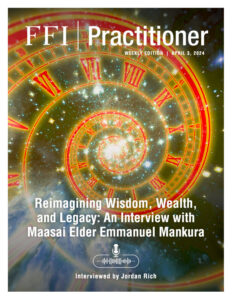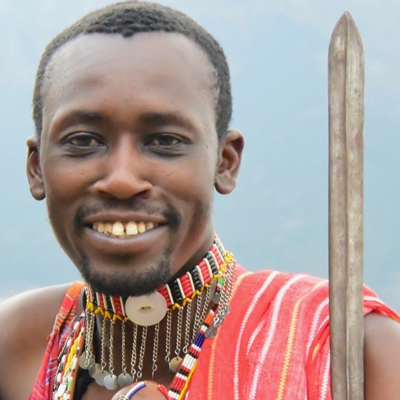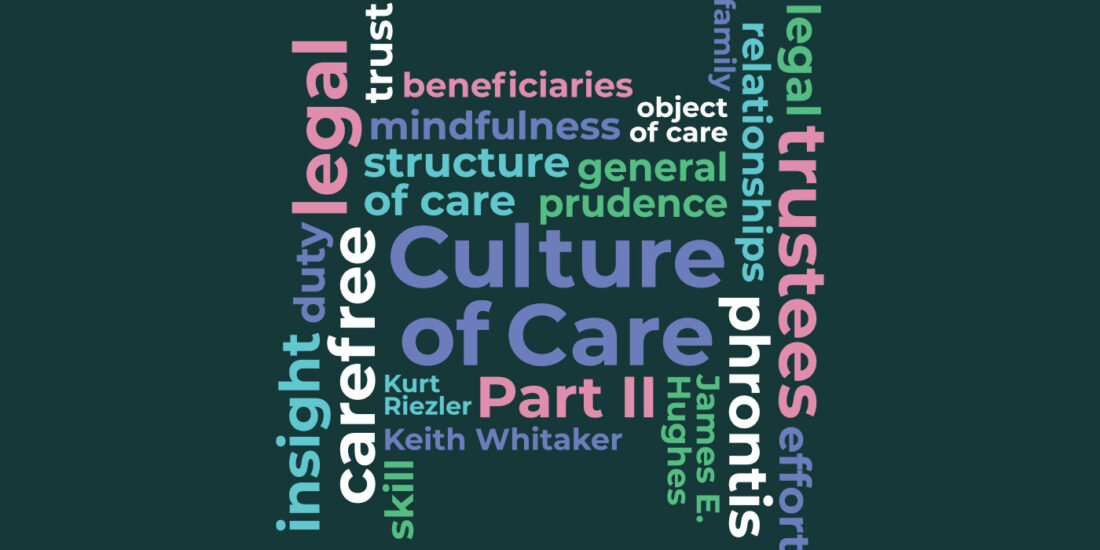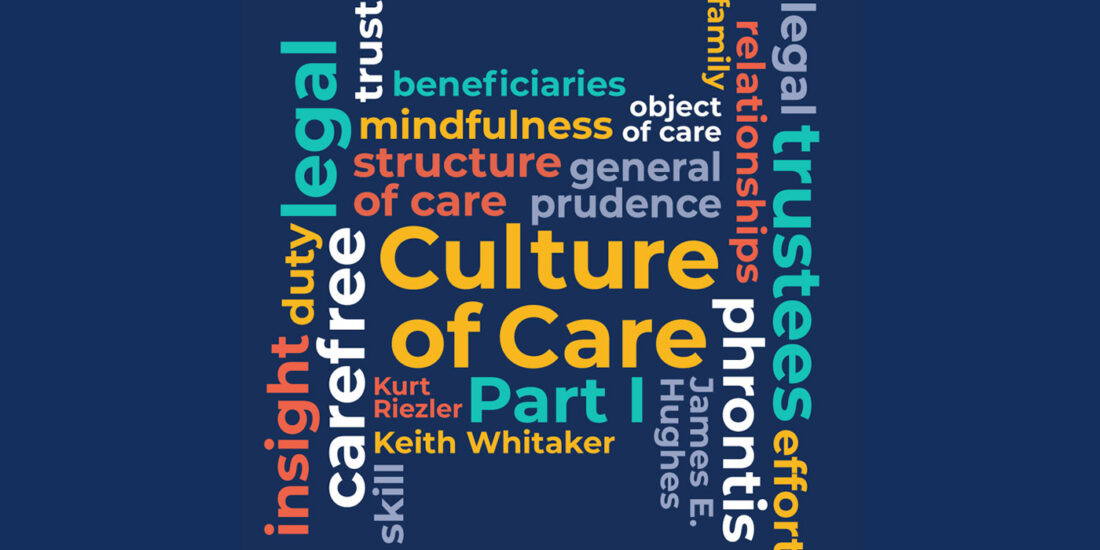
View this edition in our enhanced digital edition format with supporting visual insight and information.
Continuing our quarterly series on the 2024 FFI conference theme of “Mean Time: Time, Timing, and Timelessness in Family Enterprise,” we are pleased to present a podcast interview the Emmanuel Mankura, an elder in the Maasai tribe. In this interview, Emmanuel discusses some of the classic family enterprise topics such as trust, value, and the importance of family as he has experienced them in his own life and work. This podcast is brought to you by the FFI 2086 Society and its 2024 grant recipient, the Nomadic School of Business.
Podcast Transcript
Jordan Rich (JR): Welcome to today’s FFI podcast with Emmanuel Mankura, the first in a series of four interviews presented by this year’s 2086 grant recipient, the Nomadic School of Business. I’m Jordan Rich. Our first guest is Emmanuel Mankura, a Maasai tribe leader who will share insights into the ancient wisdom of the Maasai people as it relates to some of the classic FFI topics such as succession, transition, cross-cultural understanding, transcending borders, and more. Emmanuel, welcome. Please feel free to introduce yourself to our listeners.
Emmanuel Mankura (EM): I think I can say that we have really worked over the years trying to support many communities. Starting from our own community, our Maasai tribe, I am an elder. I have five children, one wife and five children. I live in the southern part of Kenya. In Kenya, we have many different language groups and tribes. We call them tribes. These are ethnic groups. Each one of them has a different culture, [including the] Maasai, one of the famous indigenous tribes in Kenya. I am a leader in our tribe, in our community. I’ve worked for about 20 years now with Anthony Willoughby, traveling to different parts of the world, talking to business organizations, and institutions to learn about community, authentic leadership, traditional values, [and] wisdom. For the Maasai territory, there are so many things people can learn, especially when you visit one of the famous tribes, like [our] Maasai tribe. I lead a bigger community here, about 2,000 people in total. These are people from different classes and different villages. One of the things that we do is to create a sustainable community, bearing in mind where we are coming from, where we are, and where we are going. And therefore, it’s all about the mantle that we want to hand over to the next generation.
JR: Let me ask you to define “community.” You’ve used that word a lot. “Community” means different things to different people, but how does it play out in the Maasai culture, and why is it such an important issue that we in the West can learn from?
EM: Thank you so much. “Community” can be defined in different ways. People living in several villages together and sharing the same challenges. These are the people sharing the same values. These are the people who come together and work together for the benefit of that particular people. And therefore, I would like to say it is a community here. These are the people who [have] the same mindset. These are the people working together. They are trying to achieve the same goals, the same mission. Without those objectives in our community, then we cannot define it as a community. Thank you so much.
JR: You’re talking a lot about the very basic values that keep the Maasai community together and strong and moving forward. What would be some of those values that we, all people, can share in and learn from?
EM: It is a very, very good thing, because the values that we have in the family level are the same values we have as the whole community. Therefore, we cannot differentiate the family values and the community level. That makes it very, very nice. These are the backbone of our tribe. Without the values, then we are not who we are. The values are very important in our tribe. One of the greatest values that we have is what we call “enganit.” “Enganit” is what is called in English “respect.” We have a proverb in our tribe that says, “It is respect that manages life.” So, it is respect that manages everything that we have. Without respect, it is very difficult for us to manage what we have in our community. And number two is what we call responsibility. Responsibility is knowing what you are supposed to do to be self-driven, working in your day-to-day life. You don’t wait to be asked to do something because you know your role in the community. Everyone has a greater responsibility in our tribe, and we know all our responsibilities. You don’t wait for anybody to come and ask you to do that thing, because you know it and you are there and ready to do it.
The other one is courage. Courage in our Maasai tribe is called “empijan.” We have a proverb in our Maasai tribe that says, “You cannot hold a shield for a coward.” Courage is demonstrated in leadership. Courage is demonstrated by the warriors. There is a way in which courage is demonstrated by everybody. And if we lack courage in doing things in forging our way forward, especially in important community issues, then decisions will not be reached, will not be attained. Therefore, courage is very, very important. Another value which is very, very important is trust. And in our Maasai tribe we [will ask], are you somebody who is trustworthy? Trust is a seed. It is a seed that is planted. And it grows slowly. So if you are interested in responsibility, are you going to show that trust? Are you going to be trustworthy? It grows slowly. We cultivate it. And that is when you win the trust of the community. It is a question for everyone. Do you decide that we trust? And if you are given that trust, to what extent or to what end? I mean, how are you going to be trustworthy in whatever place you have been given? Those are part of the values that we have and they have really helped us for many years. Thank you.
JR: One of the great gifts you are going to provide the FFI community, and this is a gift that you have been spreading around the world in your talks, is a definition of wealth—what it really means to you, to the members of your tribe. It gets all of us in other parts of the world to think about the meaning of wealth in our lives and what really matters. I’d love for you to chat briefly with us about your experience and understanding of wealth and what it means.
EM: We divide wealth into different parts. The material wealth is one part. The second part is the family. When we look at our families, our families make [up] part of our wealth. Because if you don’t have a family, then your wealth is meaningless in our tribe. Because then, why do you have that wealth? How long is it going to be sustainable if you don’t have a family who [take] that wealth from you [to] the next generation? The number three is our traditional cultural heritage. And we are very proud of that. Because without a traditional heritage, a cultural heritage, then you’ll not have something to be proud of. In our tribe, we tend to be proud of who we are. We tend to be proud of our wealth, our cultural heritage is very, very important. Thank you, Jordan.
JR: What is the misconception that we have about you, about Maasai or about any African tribe like yours? What are we not getting? What are we not knowing?
EM: I think meetings like these are very, very important. They are very, very important because we need to talk to each other, understand one another, understand one’s values, and understand each other. [Otherwise] it is very difficult for us to understand the other person. It is very important for us to create time, like the time that you’re creating at this moment. It is very, very important and very helpful. I do believe that the biggest problem in this world is not that people are bad; it’s that they don’t have time to understand one another. If we create time to learn from each other, then I believe that you will not be prejudiced, will not have a misconception about who we think the other people are. An enemy is a person who you do not know. If you do not know a person very well, then you’ll be biased, you’ll be prejudiced. I mean, you’ll assume things that are not fair, that are not true. But if people sit down, talk, and understand each other, then we will not have wrong judgment about one another. This platform is very, very important. When we work with different people from all over the world, I come to understand, I come to learn that these people are just like a tribe, and they [have] a way of expressing themselves. Therefore, if we understand one another, and through that communication, I get to understand their challenges, I get to understand their ways of communication, I get to understand the problems that they are going through. Through that way, we solve their problems amicably, you know, using our traditional ways, using our wisdom, using the way we are solving our problems in our community.
JR: Before we conclude, so many people listening to this podcast are thinking about their legacy. What is your thought on legacy and how important it might be?
EM: All of us, especially people like our tribe, a tribe that [does] not have a written alphabet, a tribe with a rich culture that we got from our forefathers in our tribe [very long ago]. For this reason, we are developing the younger generation—so that we are able to give them the mantle to take it further to their next generation. We are very careful because right now there are very many forces, internal and external forces, and if we are not careful about what we are going to give to our next generation—and we believe that culture is dynamic, it changes—whenever we meet with somebody else, we get something and we lose something.
In the previous years, when the Maasai were coming down from the northern parts, from Ethiopia, from Cairo, from Egypt, coming down to the present place that we live, we adopted different things. These are habits, these are taboos, and what we are going to give to the next generation? One is our values. Our values are one of the things that we like to see going to the next generation. These are the values that I’ve just talked about, things that make the Maasai unique. When you see a warrior going to kill a lion, it is because of the bravery, it is because of the courage, but could we use the courage in different ways? Therefore, the values are the number one thing that we like to see going to the next generation.
JR: I love your sense of optimism and faith in humanity, and I have one favor to ask of you before we conclude, how would I say in your native language the words “thank you”?
EM: The word for “thank you” in our Maasai tribe is “ashe.” And if you want to say, “Thank you very much,” you say “ashe oleng.”
JR: Ashe oleng.
EM: Thank you so much, Jordan.
JR: Thank you again, Emmanuel. We hope this podcast has motivated our listeners to join the first of the online seminars with Emmanuel and others from the Nomadic School of Business. The seminar will take place virtually Thursday, April 18th, from 9:30 to 11:00 a.m. eastern time. It’s open to FFI members and non-members. To learn more and to register, go to ffi.org. This is Jordan Rich, as always thanking you for listening.
About the Contributor

Emmanuel Mankura, a captivating speaker and cultural luminary, draws on his profound connection to Maasai heritage. A distinguished cultural ambassador, Mankura shares insights into the ancient wisdom of the Maasai people, transcending borders and fostering cross-cultural understanding in an effort to create more interconnected and harmonious global community.
Interviewer: Jordan Rich is celebrating a quarter century at one of America’s top legacy radio stations, interviewing thousands of celebrities, authors, actors and interesting personalities throughout his career. Jordan is co-owner of Chart Productions Inc, and also teaches voice-over acting. His main focus these days is in podcast creation and production, featuring conversations with the world’s most creative people.

View this edition in our enhanced digital edition format with supporting visual insight and information.





